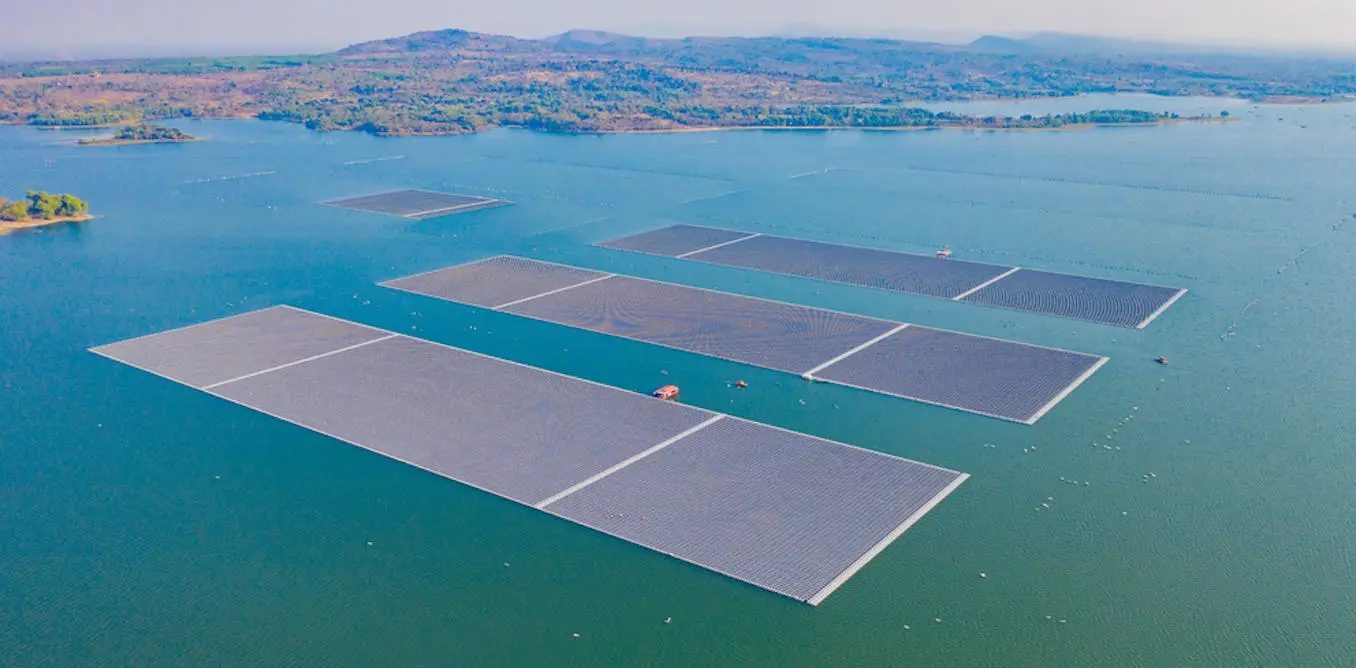‘Limitless’ energy: how floating solar panels near the equator could power future population hotspots::New research shows densely populated countries in Southeast Asia and West Africa could harvest effectively unlimited energy from solar panels floating on calm tropical seas near the equator.



If these are too big then presumably it’ll block sunlight from that patch - that not a bad thing? I assume you’d need a lot for it to have an effect and the sea is pretty big…
Yeah, any time I see one of these “big ideas!” I’m super skeptical… our solutions aren’t going to be easy innovations. They’re going to be hard, boring fixes.
One benefit is “cooling” the water underneath as we’re running into record high sea temps.
Smaller panels spread out would be better since they can let in a decent average amount of light vs a big ass panel blocking everything in one area. But then you run into the issues of connecting all of those panels and that makes getting the power out of the ocean and into your house even harder.
That’s an interesting question. I don’t have a lot of expertise on this topic, but my understanding is that tropical seas have some areas around reefs that are teeming with life and others that are relatively barren? So choosing a barren patch would seem the sensible option.
But I wonder. Even along reefs, there is this unfolding crisis of coral bleaching driven at least in part by global warming. Could a limited number of panels deployed in a loose fashion provide some shade and keep coastal waters cooler? Could this actually be beneficial to equatorial corals if done with care? There are a lot of assumptions here, though, and I wouldn’t want to jump to conclusions.
If you look at the coral reef map, you can see that a huge portion of the sea in SEA is pretty barren.
I was wondering the same thing. Just considering algae, it absorbs a large portion of the world’s CO2. But the ocean is massive and a relatively tiny covered patch wouldn’t dent it much.
Add the fact that the solar panels would negate some of the need to burn fossil fuels, I think the outcome is more than net positive.
As far as any negative impact on wildlife and the biosphere, I’m sure it’s negative, but I don’t know much about it.
This is fucking stupid imo. We have more than enough land area for solar as it is. Why would you add 100x the complexity to your solar plant when you can just build it on land? Now you have to deal with tides, salt water corrosion, your technicians have to be scuba divers or something, running transmission lines through salt water is much harder than the ground. What happens when there’s an electrical fault that kills a bunch of people because they’re submerged in highly conductive salt water?
If you had read even the first sentence of the article, you might’ve learned that just maybe they have a reason to not use land.
Not enough land.
Not every place is like central Africa or Ohio. Basically all coastal regions near the equator (which are the only places they are recommending this) are densely populated. To get the amount of solar panels they suggest, you would have to go far inland (if there is any inland) and have many more much smaller solar plants, and that’s more maintenance than single giant solar field, though as you’ve said, I’m sure on the sea comes with it’s own maintenance problems.
The article also talks about waves, wind and other environmental affects, and shows all the places where the “defences” against the environment wouldn’t have to be strong or expensive.
They most definitely don’t suggest that this be used everywhere. The main example they talked about is Indonesia. Extremely densely populated with little suitable land for solar plants.
TLDR: In most places this is stupid… but they never suggested that. There are certain places where it is viable and possibly the only option for large solar farms.
It would affect the small area underneath, though we are struggling with ocean warming atm so anything blocking sunlight in is probably good.
Most of the sea in those region is pretty barren with mud/sand sea floor. As long as they don’t put it above a coral reef I imagine the ecological impact would be small. Might even have a positive impact because it might provide shelter for young fish in an otherwise barren patch of sea.